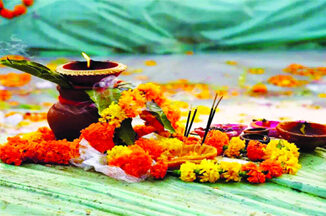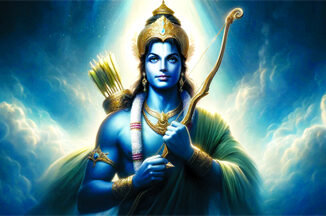
The fast of Karwa Chauth is of particular importance to all Hindu married women in India. They believe that the festival ensures prosperity, longevity and well-being of their husbands. The origin of this festival was based on a very sweet and noble idea. Though this idea has lost its true sense as today the whole outlook of this festival has changed. In the ancient time, girls used to get married at a very early stage, and had to go and live with their in-laws in other villages. After marriage, if she faces any problem with her in-laws or her husband, she would have no one to talk to or seek support from. There used to be no telephones, buses and trains long ago. Her own parents and relatives would be quite far and unreachable. Thus the custom started that, at the time of marriage, when bride would reach her in-laws, she would befriend another woman there who would be her friend or sister for life. It would be like god-friends or god-sisters. Their friendship would be sanctified through a small Hindu ceremony right during the marriage. Once the bride and this woman had become god-friends or god-sisters, they would remain so all their lives and recognize the relation as such.

They would also treat each other like real sisters. Later in life, if she faces any difficulty related to her husband or in-laws, she would be able to confidently talk or seek help from each other. Thus, Karwa Chauth was started to as a festival to celebrate this relationship between the once-brides and their god-friends (god-sisters). Fasting and praying for husband came later and is secondary. It was probably added, along with other mythical tales, to enhance the festival. The husband would always be associated with this festival, because the day of starting this holy friendship between two god-sisters was essentially the day of bride’s marriage to him. Thus, praying and fasting for him by his wife during a celebration of her relationship with the god-friend would be quite logical. Hence, the festival of Karwa Chauth was to renew and celebrate the relationship between god-friends (godsisters). It had a tremendous social and cultural significance when world was not having the way to communicate and move around easily.
The Story of Queen Veeravati
A long long time ago, there lived a beautiful girl by the name of Veeravati. She was the only sister of her seven loving brothers, who was married to a king. On the occasion of the first Karva Chauth after her marriage, she went to her parents’ house. After sunrise, she observed a strict fast. However, the queen couldn’t stand the rigors of fasting and was desperately waiting for the moon to rise. The seven brothers who loved her dearly, were very disturbed watching the distress of their sister and decided to end her fast by deceiving her. Then the brothers reflected a mirror through Pipal tree leaves. The sister, taken it as moon rise, broke the fast and took food. However, the moment the queen ate her dinner, she received the news that her husband, the king, was seriously ill. The queen rushed to her husband’s palace and on the way, she met Lord Shiva and his consort, Goddess Parvati. Parvati informed her that the king had died because the queen had broken her fast by watching a false moon. However, when the queen asked her for forgiveness, the goddess granted her the boon that the king would be revived. But to achieve this, she would have to undertake the Karva Chauth fast under strict rituals, then only her husband would come top life. Thus, by strictly following all the rituals of Karva chauth, queen Veeravati relivened her husband.
The Legend of Mahabharata
The belief in this fast and its associated rituals goes back to the pre-Mahabharata times. Draupadi, too, is said to have observed this fast. Once Arjun went to the Nilgiris for penance and the rest of the Pandavas faced many problems in his absence. Draupadi, out of desperation, remembered Lord Krishna and asked for help. Lord Krishna reminded her that on an earlier occasion, when Goddess Parvati had sought Lord Shivas guidance under similar circumstances, she had been advised to observe the fast of Karva Chauth. Draupadi followed the instructions and observed the fast with all its rituals. Consequently, the Pandavas were able to overcome their problems. On this day, fasting women listen to Karva Chauth legends with rapt attention. The Story of Satyavan and Savitri There is the story of the Satyavan and Savitri. When Lord Yama, came to procure Satyavan’s soul, Savitri begged him to grant him life. When he refused, she stopped eating and drinking and Yamraj finally relented. He granted her, her husband’s life. To this day, Karva Chauth is celebrated with great faith and belief.
The Legend of Karva
According to another legend, a woman named Karva was deeply devoted to her husband. One day while bathing, he was caught by a crocodile. Karva came running and bound the crocodile with a cotton yarn. She then went to Yama, the Lord of the death, and requested him to send the offending crocodile to hell. When Yama refused, she threatened to curse him. Afraid of the power of a devoted wife, Yama readily accepted and sent the crocodile to Yamalok or hell, and blessed Karva’s husband with long life. Karwa Chauth festival has an extraordinary observance rate among married women in Punjab, Uttar Pradesh, Rajasthan and Gujarat. This is a significant day for married women as they keep fast for the long-life and well-being of of their husbands. The way of celebrating Karwa Chauth vary from each other on regional basis. PUNJAB : The festival of Karwa chauth is one of the most important festival for married women in Punjab. Few days before this auspicious festival, all the markets in Punjab gets flooded with various accessories and decorative items including bangles, beautiful sarees, embroidered suits, stalls of sweets and eatables. Number of artists from different cities like Agra, Jaipur, Delhi, etc gather here with their special mehndis to decorate hands of women.
In some parts of Punjab, young damsels too keep the fast in the hope of winning a loving husband. RAJASTHAN : Among the women of Rajasthan, the festival of Karwa Chauth has its own meaning. The women make the karwas with mud and fill them with rice and wheat. They wear their weddingday dress or chunris on this auspicious day. Karwa Chauth generally falls on the full moon day of the month Jyeshtha. This is also known as ‘Vata Purnima’. Interestingly, the woman who observes this fast is not only blessed with welfare of her husband but also wins the same husband for the next seven births. UTTAR PRADESH : In Uttar Pradesh, the married women keep the fast and pray for the long-life of their husband. They decorate the walls of their home with drawings of Gauri Ma, the moon and the sun. They also make the karwa with mud and perform the evening puja with earthen lamps. Before looking at the moon, the women pray to the figurines at their doorstep. OTHER STATES : Other Indian states also observes this fast. In Gujarat, many women observe this fast with great spirit. In Madhya Pradesh also, most of them follow the traditions of the women from Uttar Pradesh. In all these states the first ‘Karva Chauth’ of any new bride is a very important festival. New clothes, new jewelery and gifts from both mother and mother-in-law are received. The wedding day outfits are worn once again, mehndi is applied and the family gathers to celebrate it with them. There are many similar stories associated with this festival in different parts of India. In Maharashtra this particular fast is not very popular but a similar one called ‘Vaat Savitri’ is kept by married women.
Celebrations
The day of Karva Chauth is celebrated mostly amongst the entire North Indian community settled either in India and other parts of the world. The most important aspect of this day is that a dawn to dusk fast is undertaken by the North Indian ladies and seeing the moon they finally break the fast. The Karva Chauth fast is unique perhaps because nowhere in the world does a wife go without food or water just to pray for the longevity and well-being of her husband. In modern day, with all the trappings of commercialization attached, Karva Chauth, the big fasting day has turned into a full-fledged event. The event is growing bigger with each passing day. Karva Chauth celebrations promise to grow bigger with each passing year. The Halwais, the Mehendi and Churiwallis have traditionally been busy on this auspicious day. But joining the bandwagon in recent times are the beauty parlour owners, the event managers and the restaurant owners. Karva Chauth special eateries are gearing up for now. Cashing in on the popularity of ‘eating out’ most restaurants have special menus for this special day. No wonder almost every happening-eating joint around town is offering plenty of attractive options to choose from. Various clubs organize special events on this festive day with various stalls, bumper Tambola and even a dance competition. With so much feasting and fun added to it, fasting had never been so good before.






Be the first to comment